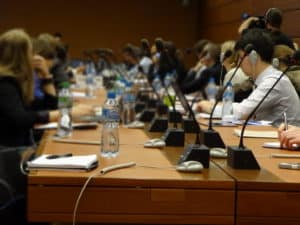
It provides for an independent unit to be established in the Attorney General’s Office with its own independent investigators, elite police force and funding. Their purpose will be to investigate, prosecute and dismantle the economic and political structures behind the paramilitary groups. [2] (as they are refered to in the Peace Accord).
The National Security Guarantees Commission is the policy committee that will oversee the work of this unit. It is led by President Juan Manuel Santos and has ministerial level representation from a cross-section of ministries [3], in addition to this, and most importantly, it also contains experts from civil society organisations (CSOs).
The experts representing Human Rights Organisations are Gustavo Gallón, Director of the Comisión Colombiana de Juristas, who is representing the Alianza de Organizaciones Sociales y Afines and Franklin Castañeda, President of the Comité de Solidaridad con los Presos Políticos (Comittee for Solidarity with Political Prisoners), representing the Coordinación Colombia-Europa-Estados Unidos group of NGOs.
In the current situation of serious threats and high numbers of killings of defenders it is essential that this Commission meets quickly and in the early stages as frequently as needed to ensure that the task of designing a policy to eradicate paramilitarism is established. According to the Colombian Commission of Jurists, it will need to elaborate policy reforms, design strategies, and propose adjustments in relation to intelligence, supervision of private security companies and surveillance services.
The continued existence of neo-paramilitary groups (referred to as Criminal Gangs- BACRIM by the Colombian Government) is a major threat to peace and security in Colombia. ABColombia continues to receive reports that they are moving into the power vacuums left by the FARC when they moved to the Transitional and Normalisation Zones and Transitory Points.
For example Bishop Hugo Alberto Torres Marin, in a Public Statement published on 3 February 2017 outlined the absence of the Colombian State anbd the sense of abandonment felt by the civilian population in the regions of Urabá and Cordoba. He also denounced the unprecedented level of killings of social leaders and called on the State to ensure that these it exercised democratic governance of the regions, take action against the neo-paramilitary groups and protects its citizens. Read more here
The Comision Intereclesial de Justicia y Paz (Justice and Peace Commission-CIJP) a Christian Aid Partner reported that approximately 600 neo-paramilitaries had announced a plan to establish themselves in Curvaradó “to secure the land for their bosses,” and for that purpose they would have to “remove the Justice and Peace Commission and the Patriotic March.” “Our mission is to secure the land for those who are in jail.” [4] These neo-paramilitaries have publicly declared they are going to initiate a project to “recover” the territory and that anyone opposing them will be killed. This “recovery” suggests forced displacement of the Afro-Colombian communities living on their collectively owned land in Curvaradó, Jiguamiandó and Bijao who have for many years been courageously resisting threats and attacks.
The Colombian State needs to provide a rapid and immediate response to the insecurity of its citizens and human rights defenders.
In additiion there needs to be a sustainable long term response which includes the dismantling of the neo-paramilitary groups. Full implementation of Point 3.4 in the Peace Accord – the Chapter on Security Guarantees – offers the possibility of dismantling these neo-paramilitary structures. Since it provides for the investigation and prosecution of the financiers and those who offer political support to these groups. Without financial and political backing it will make it difficult for military wing of the neo-paramilitaries to continue to operate and easier for the State to dismantle them.
[1] Final Peace Agreement between the Government of Colombia and the FARC-EP signed in November 2016
[2] The paramilitary groups are referred to in various terms in the Peace Accord e.g. as heirs to the parmilitaries,Criminal Gangs etc.
[3] The full membership of the committee is as follows: Minister of the Interior, Minister of Defence, Minister of Justice, Attorney General, Human Rights Ombudsman, Director of the Special Investigation Unit (punto 74 de la Jurisdicción Especial para la Paz), Commander General of the Military Forces, Director General of the National Police, 3 experts elected by the Comisión de Seguimiento y 2 representatives from the Networks of Human Right’s Organisations
24 February 2017
